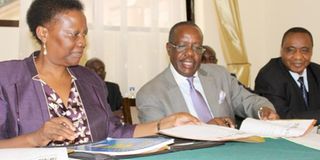Tanzania to buy shares in Ugandan refinery

Uganda’s Energy Minister Irene Muloni, Tanzania Energy minister Sospeter Muhongo and Tanzania Permanent secretary in the Ministry of Energy and Mineral Development Justin Ntalikwa discuss during oil refinery negotiations in Hoima District last week. Photo by Francis Mugerwa
What you need to know:
Tanzania wants the pipeline corridor to be wide enough to accommodate a gas pipeline, which will enable Tanzania to export its gas reserves
Hoima. Tanzania has said it will buy shares in Uganda’s oil refinery. A total of 6.5 billion barrels of crude oil have so far been confirmed from about 40 per cent of the explored wells in western Uganda.
While some of the oil will be exported in crude form using a pipeline to Tanga in Tanzania, the government also plans to build a refinery through a public-private partnership.
A delegation from Tanzania held closed-door negotiations with their Ugandan counterparts who were led by Energy and Mineral Minister Irene Muloni in Hoima on July 5.
The following day, the officials visited the proposed oil refinery site in Kabaale Parish,Mputa-5,Mputa-2 oil wells, Tullow oil’s Kisinya camp, Kyehoro Health centre III and Enviroserve oil waste treatment plant.
The Tanzania minister of Energy and Mineral Development, Prof Sospeter Muhongo, told Ugandan government officials that they have the money to invest in Uganda’s proposed 60,000 barrels per day oil refinery.
“We are grateful that Uganda government has offered East African states to buy a maximum of 8 per cent shares in the refinery. We are determined to take all the 8 per cent shares. Our initial calculations indicates that the shares will cost 150.4 million dollars,” Muhongo said.
He said the investment in Uganda’s oil refinery is part of a decision that Tanzanians have made to invest in regional oil infrastructural projects.
Prof Muhongo led a delegation that among others included Prof Justin Ntalikwa, the Permanent secretary in Tanzania’s ministry of Energy and Mineral development, directors and technocrats in the Tanzania Petroleum Development Corporation, Tanga Ports Authority and officials from Ministries of Works, transport and communication.
Tanzania is partnering with Uganda to build a 1,443-kilometre crude oil export pipeline.
The mission
According to Muhongo, Tanzania wants the pipeline corridor to be wide enough to accommodate a gas pipeline, which will enable Tanzania to export its gas reserves.
He said Tanzania has more than 57.25 trillion cubic feet of natural gas which is commercially viable.
“We want to offer this commodity to East African countries. It is very likely that the (crude oil pipeline) corridor we are planning will also have a gas pipeline coming to Uganda, Kenya and elsewhere,” Prof Muhongo said.
Partnering with East African states to develop their commercially viable natural resources, Prof Muhongo said, will give East Africans an opportunity to move out of poverty.
While Uganda plans to achieve a middle income status by 2020, Tanzania plans to achieve a similar status by 2035.
“We want all the protocols complete so that we partner with you in the construction of a refinery and using refinery products,” Prof Muhongo said.
The Ugandan Government recently suspended negotiations with Rostec Global Resources (RTGR) Consortium of Russia for the role of Lead Investor for the Uganda refinery Project.
The government team had shortlisted two bidders namely RTG, which was ranked as number one and the preferred bidder and the other led by SK Engineering of South Korea ranked as second and alternate bidder.
Ministry of Energy permanent secretary Fred Kabagambe Kaliisa, said the suspension of negations with RT Global resources will not affect Uganda from proceeding with its refinery project.
Government has been in negotiations with the RT-GIobal Resources Consortium for the last 44 months and a final agreement was reached in principle in May.
However, just prior to the expected signature date at the beginning of June, Kaliisa said, the RT-GIobal Resources Consortium made additional demands from the Government, seeking to reopen and renegotiate issues that had already been agreed on between the parties.
“Consequently, government was left with no choice but to halt negotiations and draw the bid bond. We shall quickly discuss with the alternate bidder, SK Engineering & Construction,” Mr Kaliisa said.




